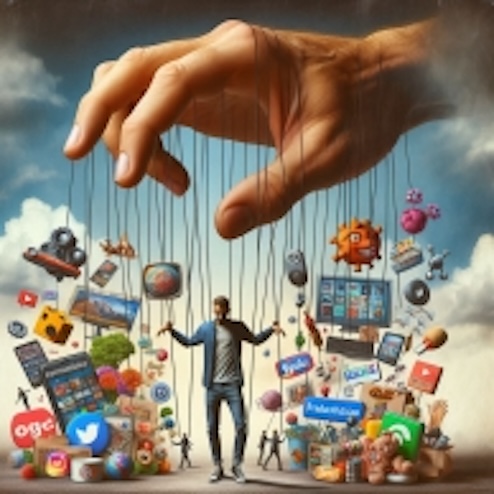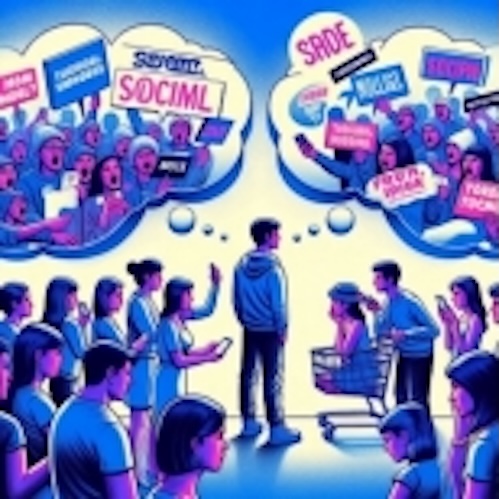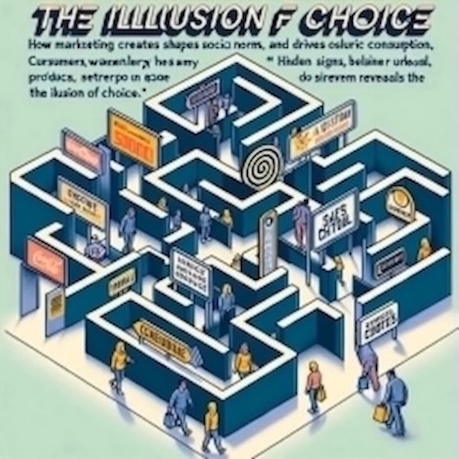Social Norms Shape Consumer Behavior!
Through "Social Norms Shape Consumer Behavior" you will know exactly how social norms play a crucial role in shaping consumer behavior by influencing individuals' purchasing decisions, preferences, and attitudes toward products and services. These norms are the unwritten rules and expectations that govern societal behavior, guiding what is considered acceptable or desirable within a given community or culture.
 How Social Norms Shape Consumer Behavior? - Unveiling the Influence of Marketing: In What Ways Does Marketing Manipulate Consumer Behavior? - A surreal image of a giant hand holding a puppet-like consumer, with strings attached to various advertisements, social media posts, and product placements. The consumer appears unaware, their movements dictated by unseen forces. The background features glowing screens and billboards, reinforcing the idea of subconscious manipulation.
How Social Norms Shape Consumer Behavior? - Unveiling the Influence of Marketing: In What Ways Does Marketing Manipulate Consumer Behavior? - A surreal image of a giant hand holding a puppet-like consumer, with strings attached to various advertisements, social media posts, and product placements. The consumer appears unaware, their movements dictated by unseen forces. The background features glowing screens and billboards, reinforcing the idea of subconscious manipulation.Consumers often look to social norms to determine what products to buy, how much to spend, and which brands to trust. These norms can be explicit, such as legal regulations or industry standards, or implicit, like cultural traditions and peer influences. They create a sense of belonging and identity, encouraging individuals to conform to group expectations.
Marketing strategies frequently leverage social norms to drive consumer engagement. Brands use endorsements, testimonials, and social proof to signal popularity and desirability. When consumers perceive a product as widely accepted or favored by their peers, they are more likely to adopt it themselves.
Social norms also shape ethical and sustainability considerations in consumer behavior. As societal values evolve, consumers increasingly prioritize eco-friendly, socially responsible, and ethical products. Businesses respond by aligning their offerings with these shifting expectations.
Additionally, digital and social media platforms amplify the impact of social norms on consumer behavior. Online reviews, influencer recommendations, and viral trends create powerful social cues that influence purchasing decisions.
Ultimately, social norms serve as a guiding force in consumer behavior, shaping preferences, brand loyalty, and purchasing patterns across various industries and markets.
We included a commercial and marketing article in this website, because of the social norms we are discussing through tens of articles following the economical development in the last three eras, as we also follow the geopolitical and ideological ideals of these eras. The tens articles on social norms and established narratives are all hanging together with the economics, geopolitics and ideology that shaped all of the discussed eras in this network.
Here are the pages covering the economical, geopolitical and ideological impacts of the three eras with the pages covering the dominant narratives, that span art, culture, economy, politics and the societal frameworks:
- Why Expanding Horn Africa to Include Other States and Global Impacts?
- A New Era of Chaos and Distrust is Shaping!
- Pre-Cold War Era of Colonialism & Imperial Rivalries!
- Pre-Cold War American Expansionism!
- The Cold War Era: A Battle of Ideologies and Influence!
- Why Do Nations Fragment When Unity is Their Greatest Strength?
- Eastern Europe Socialist Bloc Fragmentation!
- Sudan and U.S. Policy: A Terrorism Connection? What's The Real Story?
- Eritrea Was Too Late to Independence Due to Colonial Conspiracies!
- Namibian Road to Independence From Liberation to Sovereignty!
- The Post-Cold War Era: A Shifting Global Landscape!
- How Economics, Ideology, and Geopolitics Fragment Nations and Create New Ones?
- New World Order: Stability or Chaos?
- Why Am I Saying A New Era of Disorder and Doubts is Shaping?
- Rewriting History: The Lies We Inherit!
- Illusion of Institutional Narratives!
- Why Prevailing Perspectives Fail Us?
- Conventional Narratives Are Always Wrong!
- Rewriting History: The Lies We Inherit!
- How Established Opinions Shape Perception?
- Established Frameworks Invisible Forces!
- Dominant Perspectives Shape Our World!
- Mainstream Ideologies Shape History!
- Origins of Misleading Narratives!
- Breaking the Illusion of Truth: Psychological Liberation & Intellectual Growth!
- Social Norms Shape Consumer Behavior!
Unveiling the Influence of Marketing: How Social Norms Shape Consumer Behavior?
Here's what you'll read on this page:
Marketing is more than just advertising... it is a powerful force that shapes beliefs, drives trends, and influences consumer behavior, shaping how individuals perceive, engage with, and respond to marketing in ways we often don’t recognize. From the products we buy to the trends we follow, marketing strategies subtly reinforce societal expectations, influencing consumer behavior in ways that often go unnoticed. By other words, from social norms that dictate purchasing habits to strategic manipulation that fuels superficial consumption, marketing plays a central role in how people **perceive value, status, and identity.
This exploration delves into deep connection between marketing and social norms, unfolding the hidden mechanisms behind marketing influence, critically examining key questions:
- How Social Norms Shape Our Beliefs? - The ways in which societal expectations condition consumer behavior.
- In What Ways Does Marketing Manipulate Consumer Behavior? - A deep dive into psychological, social, and digital tactics used to influence purchasing decisions.
- The Illusion of Choice: How Marketing Creates Trends, Shapes Social Norms, and Drives Superficial Consumption - An exploration of how marketing manufactures desires and constructs cultural narratives, often leading to habitual, unquestioned consumption.
- How does social media reinforce consumer norms? - A knocking experiences with privacy issues exposed by targeting ads through tracking systems in every device, which raises the questions: Is marketing, or the money is more important than people's privacy?
By unveiling the hidden mechanisms behind marketing influence, this discussion critically examines whether consumer choices are truly independent or strategically guided by corporate interests.
Through these insights, readers will gain a critical perspective on modern consumer culture, empowering them to question marketing-driven narratives and make intentional choices rather than simply following trends.
Explore the articles below and uncover the true impact of marketing on thought, behavior, and society.
How Social Norms Shape Our Beliefs: A Critical Look at Consumer Behavior and Marketing!
Social norms - the unwritten rules that govern behaviour - play a profound role in shaping our beliefs. From childhood, we absorb societal expectations that influence how we think, act, and even what we buy. In the realm of consumer behavior and marketing, these norms are strategically leveraged to drive purchasing decisions, often reinforcing existing beliefs rather than challenging them.
This article critically examines how social norms shape consumer behavior, how marketing exploits these norms, and whether individuals can truly break free from socially conditioned consumption patterns.
1. The Power of Social Norms in Consumer Behavior
Social norms dictate what is acceptable, desirable, and aspirational and brands capitalize on this. Consider these key influences:
- Conformity & Social Proof: People tend to follow what others do, believing that popular choices are the best choices. This is why trends and influencer marketing are so effective. They examine responses and react with no greater attention to privacy, in a time that privacy violations getting less to notice. At the other hand great deal of consumers are not aware enough of serious issues like privacy.
- Status & Identity: Consumers often buy products that align with their social identity. Luxury brands thrive on exclusivity, reinforcing the idea that status is tied to possessions. Focusing marketing toward consumers based on the possessions factor influence consumers to focus on individual status and indemnity... a sort of selfish thinking.
- Fear of Missing Out (FOMO): Marketing campaigns create urgency, making consumers feel that not participating means being left behind socially. A social norm of marketing that reinforce individual interests, enlarging the social gabs between people. By concentrating in this term "fear of missing out" marketing creates intent for customers to focus on other issues that less important than other issues encounter in their world, like shifting climate, shifting economies, shifting policies, etc...
These norms shape purchasing habits, often leading people to buy based on perception rather than necessity.
2. Marketing as a Reinforcer of Social Norms
Marketing doesn’t just respond to social norms... it actively creates and reinforces them. Some critical ways this happens:
- Advertising Constructs Reality: Ads don’t just sell products; they sell lifestyles and ideals. They define what is "normal" or "aspirational," influencing beliefs about beauty, success, and happiness.
- Cultural Conditioning: Brands embed themselves into cultural narratives, making certain products feel essential to identity (e.g., coffee culture, tech gadgets, fashion trends).
- Manipulation Through Psychology: Marketers use behavioral psychology to tap into subconscious desires, reinforcing habitual consumption rather than rational decision-making.
This raises the question: Are consumers making independent choices, or are they simply following socially conditioned behaviors?
3. Can Consumers Break Free from Socially Conditioned Beliefs?
While social norms heavily influence consumer behavior, individuals can challenge and reshape their beliefs. Some ways to break free:
- Critical Thinking & Awareness: Recognizing how marketing manipulates perception is the first step toward making *intentional choices rather than reactive ones.
- Minimalism & Conscious Consumption: Rejecting the idea that "more equals better" can help consumers prioritize value over status-driven purchases.
- Ethical & Sustainable Choices: Supporting brands that challenge harmful norms (e.g., body positivity, environmental responsibility) can shift consumer culture toward more meaningful engagement.
Ultimately, breaking free from social norms in consumption requires active questioning... asking why we believe certain products or lifestyles are necessary and whether they truly align with our values.
Social norms shape our beliefs in ways we often don’t consciously recognize, and marketing amplifies these influences to drive consumer behavior. While it’s difficult to escape socially conditioned consumption, individuals can reclaim their autonomy by questioning the narratives they’ve been sold.
The real challenge is not just rejecting marketing tactics, but redefining what truly matters beyond the expectations society imposes.
The Role of Social Media in Reinforcing Consumer Norms!
Or... The Impacts of Heavy Marketing on a Humble & Unknowing Consumers!
Perspective: Social media has intensified the influence of social norms on consumer behavior. Platforms like Instagram, TikTok, and YouTube create hyper-curated realities, where influencers and brands shape what is considered desirable, trendy, or aspirational. Users of TikTok don't even know that when they install the app, it pulls all of their stored pictures and videos and even sensitive information in their documents.
- Algorithmic Influence: Social media algorithms prioritize engagement, pushing content that reinforces popular consumer trends.
- Microtargeting & Personalization: Ads are tailored to individual users, making marketing feel personal, even when it’s driven by mass consumer psychology. Despite this, it is correct when a consumer feels that personalisation in targeted personally with what they use when searching and even what they wear, or eat, or say inside their homes. Every camera button in their devices captures their acts in their homes... tracking people, that way and violating their privacy, that is much ignored by authorities.
- Virality & Trend Cycles: The speed at which trends emerge and disappear accelerates consumerism, making people feel pressured to constantly update their choices. Updating creates more devices garbage, even reselling their old devices cannot solve this issue, which has heavy impacts on the environment.
This perspective strengthens the argument that marketing doesn’t just respond to social norms... it actively shapes them in real time.
The Psychological Cost of Consumer Conformity!
Perspective: Beyond financial costs, consumer conformity has psychological consequences:
- Decision Fatigue: Constant exposure to marketing and social pressure overwhelms consumers, making it harder to make rational choices.
- Self-Worth & Materialism: Many people "tie their self-worth" to possessions, believing that "status-driven purchases" define their value.
- Anxiety & Social Comparison: Seeing curated lifestyles online can create unrealistic expectations, leading to dissatisfaction and "impulse buying".
This perspective reinforces the idea that breaking free from consumer-driven social norms isn’t just about spending habits... it’s about "mental well-being and self-perception".
Historical Shifts in Consumer Norms!
Perspective: Consumer norms have evolved over time, shaped by economic, technological, and cultural shifts:
- Post-War Consumerism: After WWII, mass production and advertising "normalized material wealth" as a sign of success.
- Digital Age & Personal Branding: The rise of social media turned few individuals into brands, making consumption a "form of self-expression.
- Sustainability & Ethical Consumption: Recent movements challenge traditional consumerism, promoting minimalism, ethical sourcing, and mindful spending.
This perspective provides historical context, showing that consumer norms are not fixed... they evolve based on societal changes.
More In-depth Hits - In What Ways Does Marketing Manipulate Consumer Behaviour?
Marketing is often seen as a tool for informing consumers, but in reality, it is a highly strategic system designed to influence, persuade, and even manipulate behavior. Through psychological tactics, social conditioning, and digital algorithms, marketing shapes desires, creates artificial needs, and drives purchasing decisions... often without consumers realizing the extent of its influence.
This article explores how marketing manipulates consumer behavior, examining the psychological, social, and technological mechanisms that make people buy, believe, and conform, without having any knowledge about what these mechanisms hide.
1. Psychological Manipulation: The Science of Influence
Marketing leverages human psychology to create emotional responses that drive purchasing decisions. Some key tactics include:
- Scarcity & Urgency: Limited-time offers and "low stock" alerts create a "fear of missing out (FOMO)", pushing consumers to act impulsively.
- Anchoring Effect: Prices are strategically placed to make a product seem like a "better deal" (e.g., showing a high original price next to a discounted one). Many people actually realise the manipulation of this process and don't know that before the seasonal deals companies raise the prices to lower it in the free season deals.
- Emotional Appeals: Ads use "nostalgia", "happiness", "fear", or "aspiration" to make products feel personally meaningful, rather than just functional.
- Loss Aversion: Marketing emphasizes "what consumers might lose" if they don’t buy, rather than what they gain.
These tactics override rational decision-making, making consumers feel compelled to buy rather than logically evaluate their needs.
2. Social Conditioning: The Power of Norms & Trends
Marketing doesn’t just respond to social norms... it actively creates and reinforces them. Some key ways this happens:
- Influencer Culture: Social media influencers shape what is desirable, making products feel like "must-haves" rather than choices.
- Status Symbol Marketing: Luxury brands position their products as "markers of success", reinforcing the idea that "possessions define worth". Many consumers don't know "possession" is a capitalist term and form through which capitalism capitalises.
- Trend Cycles & Fast Fashion: Rapidly changing trends pressure consumers to constantly update their wardrobes, tech, and lifestyle choices. Well, this creates a business for social humanitarian organzations to function, selling second hand items.
- Peer Pressure & Social Proof: Seeing others buy a product validates its value, making people feel they should follow suit... presenting a selfish way of thinking.
This manipulation exploits human desire for belonging, making consumption, even the unnecessary one a social act rather than a personal choice.
3. Digital Manipulation: Algorithms & Data Tracking
Modern marketing doesn’t just advertise... it spies, predicts and controls consumer behavior through data-driven strategies:
- Personalized Ads & Microtargeting: AI analyzes consumer habits to deliver hyper-specific ads, making marketing feel personal and unavoidable.
- Behavioral Tracking: Companies track online activity to predict future purchases, subtly influencing decisions before consumers even realize it.
- Addictive Design & Dopamine Loops: Social media and shopping apps use endless scrolling, notifications, and rewards to keep consumers engaged and spending.
- Search Engine Manipulation: Companies "pay for visibility", ensuring that certain products dominate search results, shaping consumer perception.
This level of manipulation removes consumer autonomy, making choices feel organic when they are actually engineered.
4. Can Consumers Resist Marketing Manipulation?
While marketing is deeply embedded in consumer culture, individuals can take steps to regain control over their decisions:
- Critical Thinking & Awareness: Recognizing psychological tricks helps consumers make intentional choices rather than impulsive ones.
- Mindful Consumption: Asking "Do I need this, or am I being influenced?" can help break the cycle of habitual spending.
- Ethical & Independent Research: Looking beyond advertising narratives to find real product value prevents manipulation.
- Digital Detox & Algorithm Awareness: Limiting exposure to targeted ads and influencer-driven content reduces external influence.
Ultimately, resisting marketing manipulation requires active questioning... challenging the narratives that shape desires and making conscious, informed choices.
Marketing is not just about selling products... it’s about shaping beliefs, behaviors, and identities. Through psychological, social, and digital manipulation, marketing engineers consumer desires, often making people feel they are making independent choices when, in reality, they are following carefully crafted influence strategies.
The key to breaking free from marketing manipulation is awareness, critical thinking, and intentional consumption... choosing what truly matters rather than what is socially or psychologically imposed.
The Illusion of Choice: Miss World in Marketing Trends, Shapes Beauty and Drives Sexuality and Superficial Consumption!
Marketing is not just about selling products... it’s about engineering desires, shaping social norms, and redefining cultural expectations. From beauty pageants like Miss Beauty to seasonal shopping frenzies, marketing manufactures trends and occasions, making people **consume without questioning.
This cycle creates a superficial layer of consumerism, where people buy into constructed ideals rather than genuine needs. But how deep does this manipulation go, and can individuals break free from it?
1. Marketing as a Social Architect
Marketing doesn’t just respond to culture... it creates and reshapes it. Some key ways this happens:
- Beauty Standards & Social Identity: Events like Miss Beauty, or Miss World reinforce idealized beauty norms, influencing how people perceive attractiveness and self-worth.
- Fabricated Occasions: Black Friday, Singles’ Day, and Valentine’s Day are commercially driven events, designed to trigger mass consumption.
- Trend Cycles & Fast Fashion: Marketers accelerate trend turnover, making people feel outdated unless they constantly buy new products.
- Influencer Culture & Manufactured Desires: Social media normalizes aspirational lifestyles, making consumption feel like a necessity rather than a choice.
These tactics condition people to consume, often without questioning why they desire certain products or experiences.
2. The Superficiality of Trend-Driven Consumption
Marketing trains consumers to prioritize appearance over substance, leading to superficial engagement with products, experiences, and even personal identity. Some key consequences:
- Short-Term Satisfaction: Many purchases are emotionally driven, offering temporary excitement rather than long-term value.
- Status Over Functionality: Products are often bought for social validation, not because they serve a real purpose.
- Disposable Culture: Fast fashion, tech upgrades, and seasonal trends encourage waste, making consumption more about novelty than necessity.
- Identity Through Brands: People define themselves through brands, rather than through personal values or experiences.
This cycle reinforces superficiality, making people consume for validation rather than genuine fulfillment.
3. Can Consumers Break Free from Marketing’s Influence?
While marketing is deeply embedded in modern culture, individuals can reclaim their autonomy by questioning socially conditioned consumption:
- Mindful Consumption: Asking "Do I truly need this, or am I being influenced?" helps break impulsive buying habits.
- Rejecting Status-Based Purchases: Choosing products for functionality and personal value, rather than social approval, reduces superficial consumption.
- Challenging Beauty & Lifestyle Norms: Recognizing that marketing constructs ideals allows individuals to define their own standards.
- Supporting Ethical & Sustainable Choices: Investing in "quality over quantity" shifts consumption toward meaningful engagement.
Ultimately, breaking free from marketing-driven trends requires critical thinking, self-awareness, and intentional decision-making.
Marketing manufactures desires, shapes social norms, and drives superficial consumption, making people buy into trends without questioning their origins. Events like Miss Beauty and Miss World, seasonal shopping frenzies, and influencer-driven lifestyles reinforce constructed ideals, often leading to short-lived satisfaction and disposable culture.
The key to escaping marketing’s influence is awareness... recognizing how trends are engineered and making conscious choices that align with personal values rather than external expectations.
The Global Dynamics Builds Systems that Support Consumers & Solve the Problems of Deceptive Norms!
Many things that continued to happen through all of the historical eras until this moment must have to stop. These things are not only the social norms that shape consumer behaviour, they are all of the dominant conventional narratives, as well as the other economical, environmental, heath, political, social and weather crises.
The Global Dynamics analyze all of these dilemmas, provide solutions and lay the map to change these situations through the Action Guide. This guide include the grassroots of building the world to be than this one we have. Subscribe to Intelligentsia Newspaper and implement the Action Guide.
How Social Norms Shape Consumer Behavior? - Are We Repeating Colonial Mistakes in Space? [Latest on The Insight Lens: Thursday, May 08, 2025] Get here so we can support each other Incredible videosHow Social Norms Shape Consumer Behavior? - Space Wars: The Next Frontier! [Latest on The Insight Lens: Thursday, May 08, 2025] Follow the Insight Lens, or WellnessTravels
How Social Norms Shape Consumer Behavior? - Space Exploration: A Double-Edged Sword? [Latest on The Insight Lens: Wednesday, May 07, 2025]
How Social Norms Shape Consumer Behavior? - Space Exploration vs. Earth's Survival: The Real Dilemma! [Latest on The Insight Lens: Tuesday, May 06, 2025]
How Social Norms Shape Consumer Behavior? - Exploring the Unknown: Life, Environment & Cybersecurity! [Latest on The Insight Lens: May 06, 2025]
How Social Norms Shape Consumer Behavior? - From Colonial Empires to Space Frontiers: Lessons Unlearned [Latest on The Insight Lens: May 9, 2025]
How Social Norms Shape Consumer Behavior? - The Hidden Dangers of Space Exploration: Are We Going Too Far? [Latest on The Insight Lens: May 10, 2025]
How Social Norms Shape Consumer Behavior? - Trade Wars from History to Cultural Shock! [Latest on The Insight Lens: 2025-04-19]
How Social Norms Shape Consumer Behavior? - Trade Wars Reflect The Hidden Agenda of Free-Market Capitalism! [Latest on The Insight Lens: 2025-04-19]
How Social Norms Shape Consumer Behavior? - Climate Change: Myths vs. Reality! [Latest on The Insight Lens: Monday, May 05, 2025]
How Social Norms Shape Consumer Behavior? - The World is Heating Amid Trade Wars – A Crisis Ignored! [Latest on The Insight Lens: 2025-04-24]
How Social Norms Shape Consumer Behavior? -Space Exploration: Worth the Risk or Too Costly? [Latest on The Insight Lens: May 10, 2025]
How Social Norms Shape Consumer Behavior? - U.S.-China Trade Talks: A Swiss Reset! [Latest on The Insight Lens: Sunday, May 11, 2025]
How Social Norms Shape Consumer Behavior? - Robot Debate: Science & Innovation Breakthroughs! [Latest on The Insight Lens: Monday, May 05, 2025]
How Social Norms Shape Consumer Behavior? - How Trump’s Tariffs Led to Price Hikes & Consumer Resistance? [The Insight Lens]
How Social Norms Shape Consumer Behavior? - The Age of Gold: How Trade Wars and Economic Policies Shape the Future? [Latest on The Insight Lens: 2025-04-25]
How Social Norms Shape Consumer Behavior? - Robots Delivering Breaking News: Today's Global Highlights! [The Insight Lens: 2025-04-25]
What Do You Think of "Social Norms Shape Consumer Behavior"?
In consuming you take many risks you may not know about in this era of aggressive commercials and marketing everywhere to the standard that you think many marketers and their dogs are hunting you. This is unbelievable. Let me know what you think of "Social Norms Shape Consumer Behaviour". If you liked what you read, share the link of the page and subscribe to Intelligentsia Newspaper. Thank you.
Have A Great Story About This Topic?
Do you have a great story about this? Share it!
Did you get any of my books from Apple Books?
Click here to tell me & get some free books. Fill the form.
رواية "الموتُ شرقاً" تكشف لك سرّ الموت الشرقي التراجيدي المستمر للإنسان
احصل علي الرواية الآن واكتشف إنهيار القواسم المشتركة، واستلهم إبداعا يشبه الأسطورة في النص الروائي
"Follow", "like", "tweet", or "pin" the pictures to express your love! Thanks
TweetHorn Africa's Political Tragedy
Love in the Internet Time on Apple Books
Rising of the Phoenix Poetry on Apple Books
Free Poetry Picture Book
Free poetry picture book on Apple Books. You can use the images on public places for your customers to enjoy, while taking coffee.
The French & Spanish Versions
You can work the French versions and the Spanish versions of the two books above with me on, one on one bases. Contact Us.
HOAs Political Poetry Imaged
I'll be thankful, if you get one of my books.
My Books!
Publish Your BookLet's be the publishers of your book. Use the form at Contact Us.































































































